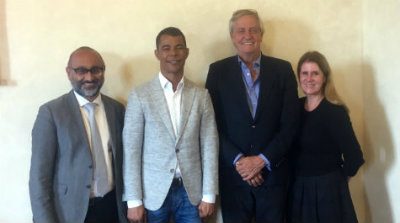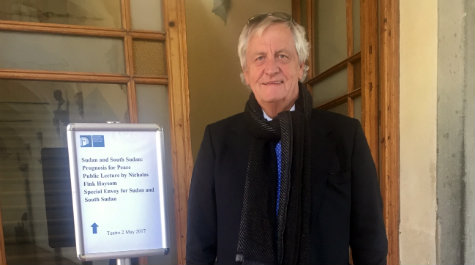Address on Sudan and South Sudan Explores Conflict and Prospects for Peace
Event at the European University Institute was co-sponsored by the Center for Comparative Legal Studies and Post-Conflict Peacebuilding
Sudan and South Sudan, historically intertwined for millennia, are at crisis points.
 In April, the United Nations Secretary General and Chairperson of the African Union Commission expressed grave concern over the escalation of violence and the growing humanitarian emergency. According to the International Crisis Group, over 40 per cent of the population of South Sudan is severely food insecure, 60 per cent higher than at this time last year, with a substantial percentage of the population already living in famine conditions. The Global Centre for the Responsibility to Protect has issued an Atrocity Alert based on escalating fighting between government forces and rebels in South Sudan and increasing numbers of refugees forced to flee their homes, and the United Nations Children's Fund and Refugee Agency report that more than two million children are now homeless as a result of civil war.
In April, the United Nations Secretary General and Chairperson of the African Union Commission expressed grave concern over the escalation of violence and the growing humanitarian emergency. According to the International Crisis Group, over 40 per cent of the population of South Sudan is severely food insecure, 60 per cent higher than at this time last year, with a substantial percentage of the population already living in famine conditions. The Global Centre for the Responsibility to Protect has issued an Atrocity Alert based on escalating fighting between government forces and rebels in South Sudan and increasing numbers of refugees forced to flee their homes, and the United Nations Children's Fund and Refugee Agency report that more than two million children are now homeless as a result of civil war.
In the absence of a unified response by the United Nations, the African Union, the Intergovernmental Authority on Development in Eastern Africa and other leaders in the region, calls have been made to recalibrate proposed solutions to the conflict. What are potential solutions, and what is the appropriate role of international actors in the face of such a massive crisis?
On May 3, these questions were addressed Nicholas Haysom, United Nations Special Envoy to Sudan and South Sudan, in a keynote speech given at the European University Institute (EUI) in Florence, Italy, and co-sponsored by the Law School’s Center for Comparative Legal Studies and Post-Conflict Peacebuilding.
In a riveting address attended by EUI faculty, doctoral candidates and post-doctoral fellows, Haysom delivered a formidable recipe of factors contributing to the decades-long conflict: more than 1.9 million internally displaced persons, many living in refugee camps in Ethiopia and Uganda; tribal and ethnic-based divisions dating from pre-colonial times; starvation resulting from displaced communities unable to plant crops; access to food being used as a weapon of war; inequitable revenue sharing from oil sourced in the south and transported to markets via pipelines through the north; intractable corruption; and governments lacking credibility due to their inability to deliver on promises and obligations.
The prognosis for peace seems bleak. Haysom challenged the audience to answer the question why the Sudanese conflict has escaped the level of attention that Syria has mustered and offered his opinion that the newly independent south, after finally gaining independence in 2011, never had a chance. Historically deriving its identity solely in opposition to the ethnically and religiously distinct north, South Sudan never developed its own coherence apart from a desire to be free from northern domination. Once independent, South Sudanese people fell back on individual tribal and religious affiliations – a fundamentalist trend not unfamiliar elsewhere in the world.
Who might be able to solve a crisis as confounding as this?
Among the community of peacemakers, there are negotiators – and there are Negotiators. Nicholas Haysom can safely be considered the latter, as everyone who has worked with him will attest. To negotiate a conflict as intractable as the one in Sudan, it takes a Negotiator.
Born and educated in South Africa, Haysom was a leader of the South African Student Union in the late 1970s, when he was placed under house arrest and held incommunicado by the apartheid government. Once released, he worked as a labor and human rights lawyer throughout the 1980s. When Nelson Mandela was released from prison, Haysom served as his personal legal adviser and chief constitutional negotiator before serving as the Legal Adviser for the African National Congress throughout the 1990s. He chaired the selection committee for members of the South African Truth and Reconciliation Committee.
Some of us work hard early in our careers in order to be able to enjoy an easy later life. For Negotiators, the opposite is true. Haysom took on his latest assignment after chairing the committee negotiating constitutional issues during the Burundi Peace Talks under the facilitation of President Mandela from 1999 to 2002 and serving as Principal Advisor to the Mediator during the 2002-2005 Sudanese Peace Process, Head of the Constitutional Support Office for the United Nations Assistance Mission for Iraq from 2005 to 2007, Director for Political, Peacekeeping and Humanitarian Affairs in the Executive Office of the United Nations Secretary General from 2007 to 2012 and Special Representative of the UN Secretary General for the UN Assistance Mission in Afghanistan from 2014 to 2016. In March 2016 Secretary General Ban Ki-Moon appointed him Special Envoy for Sudan and South Sudan.
Since March 2016, he has been based in Addis Ababa, where he maintains a schedule that would crush most ordinary mortals. Shuttling between leaders of the African Union, IGAD, UN headquarters in New York, other countries in the region and a host of nations around the globe with an interest in Sudan and South Sudan, he is one of the key point persons engaged in attempting to solve one of the more difficult global conflicts, one which has only grown more complex over the past decade.
When talking to Haysom, it becomes easier to understand the success of his remarkable career trajectory. An effective negotiator who prizes listening and inclusive processes, his personal life is as full as his professional career. The father of five, an accomplished athlete who has played competitive sports and summitted Kilimanjaro, he is also an avid reader who received the South African Playwright of the Year Award in 1987.
The qualities that earn him universal respect among parties he seeks to bring to negotiating tables are the same as those praised by his colleagues and which were on display during his presentation at EUI: integrity, decency, wisdom, humor and an ability to understand underlying human dynamics that drive protracted conflict. Despite the seemingly hopeless prognosis for peace in the two Sudans, the audience at EUI was left with the impression that if any one person can facilitate peace in the region, there is a good chance it is Nicholas Haysom.
About William & Mary Law School
Thomas Jefferson founded William & Mary Law School in 1779 to train leaders for the new nation. Now in its third century, America's oldest law school continues its historic mission of educating citizen lawyers who are prepared both to lead and to serve.



